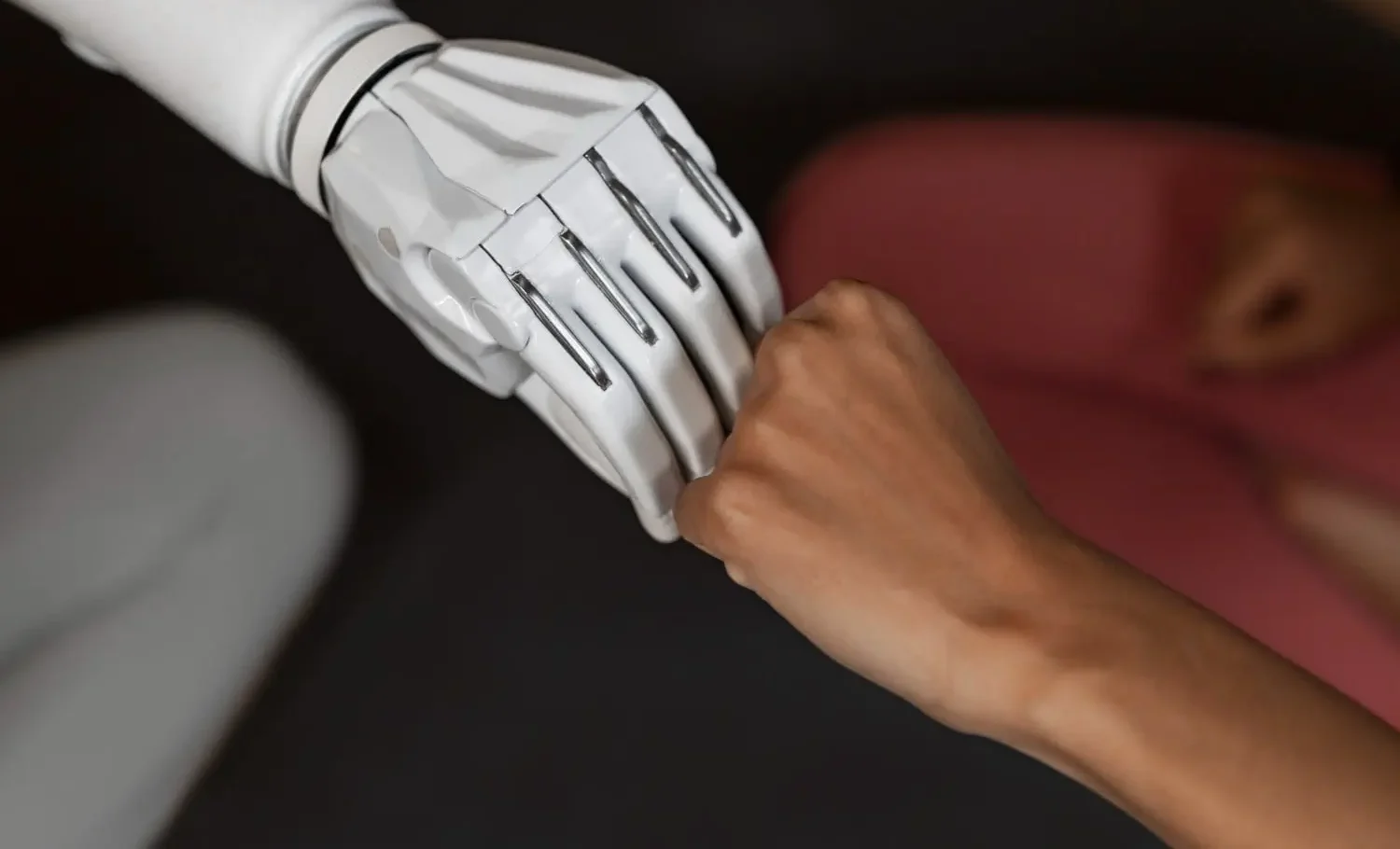We offer medical detox and multiple addiction treatment options in our
luxury treatment centres in Port Hope, Cobourg, and Ottawa.
How AI in Addiction Treatment Works
Technology is reshaping how treatment centres identify, prevent, and address substance dependencies across Canada. Artificial intelligence systems now analyze patient information to spot risk patterns, suggest personalized approaches, and predict potential setbacks before they occur. These tools don't replace the skilled therapists who guide recovery. Instead, they handle the data-heavy work, freeing counselors to focus on building healing relationships. This means better-informed treatment decisions backed by insights from thousands of recovery experiences.
Key Takeaways
- AI in addiction treatment spots risk indicators weeks ahead of traditional assessment methods by analyzing medical records, genetics, and lifestyle patterns
- Machine learning examines thousands of successful recovery paths to suggest approaches matching your situation, while therapists make final care decisions
- Predictive algorithms identify relapse warning signs, giving care teams intervention time
- Smart monitoring provides support between therapy sessions without replacing the human connection that drives recovery
- Canadian centres are adopting AI to streamline paperwork and scheduling, letting therapists dedicate full attention to patient care
What Does AI Actually Do in Addiction Treatment?

Artificial intelligence serves as a pattern recognition system that processes information far faster than human review allows. These systems examine three distinct information sources to support treatment teams:
- Medical and genetic factors – Previous health conditions, family history, medication responses, and biological markers that influence addiction vulnerability
- Behavioural indicators – Communication patterns, sleep quality, social interactions, stress responses, and daily routine changes
- Historical treatment data – Outcomes from thousands of similar cases, showing which approaches worked best for specific addiction types and individual circumstances
Traditional assessment relies on questionnaires and clinical interviews that capture snapshots of patient experiences. AI in addiction treatment continuously monitors subtle shifts—language tone in messages, engagement level changes, or emerging stress patterns—that might escape notice during weekly therapy sessions. For instance, an algorithm might detect someone's text messages growing shorter and more negative three weeks before they consciously recognize struggling, giving therapists early warning to adjust support.
Artificial intelligence recovery programs excel at connecting dots across massive datasets, but they hand those insights to human specialists who understand context, build trust, and make nuanced care decisions.
Why Can AI Predict Addiction Before It Escalates?
AI in addiction treatment recognizes vulnerability patterns by comparing current behaviours against data from millions of previous cases. These algorithms spot combinations of risk factors that individually seem minor but together signal escalating danger.
Machine learning examines several data streams simultaneously:
- Digital language patterns – Social media posts, text messages, and online activity revealing depression, isolation, or pain-related themes
- Life disruption markers – Job changes, relationship conflicts, financial stress, major transitions that increase substance use risk
- Physical health signals – Wearable device data showing sleep disruption, elevated heart rate variability, or irregular activity patterns
- Prescription behaviour – Medication refill timing, dosage changes, doctor shopping indicators
Research demonstrates these tools can flag internet addiction symptoms and other behavioural dependencies weeks before traditional screening catches them. One AI-based analysis of social media language identified 79% of patients likely to leave treatment early, giving rehab teams crucial time to intervene proactively.

Prediction creates opportunity for prevention, not predetermined outcomes. Someone flagged as high-risk receives earlier support, modified treatment intensity, or additional resources, interventions that change their trajectory entirely. The algorithm provides the warning. Human clinicians provide the care that makes the difference.
How Does AI Personalize Your Recovery Plan?

Traditional programs often apply similar protocols to everyone walking through the door—twelve steps, group sessions, standard counselling frequency. AI in addiction treatment changes this by matching your specific circumstances to approaches that worked for people facing similar challenges.
The system examines recovery paths from thousands of cases, identifying which combinations of therapy types, session frequencies, and support structures produced lasting results for individuals with profiles resembling yours. Someone with opioid dependency plus anxiety responds differently from someone with alcohol use and depression, even though both need care.
What Gets Matched to Your Situation
Your therapist receives suggestions based on multiple factors working together rather than in isolation. The substance itself matters — cocaine recovery looks different from benzodiazepine dependency. Co-occurring conditions shift everything; PTSD requires trauma-informed approaches woven throughout treatment. Past attempts inform strategy; if outpatient programs failed twice before, residential care might receive priority recommendation.
Personal strengths and obstacles shape the plan, too. Strong family support suggests incorporating relatives into sessions. Work schedule inflexibility might indicate evening group therapy slots. Cultural background influences which therapeutic frameworks resonate.
The artificial intelligence recovery system presents options—your counsellor decides. They know you've mentioned mistrusting group settings, or that spiritual approaches don't fit your worldview, or that your insurance coverage limits certain options. Technology suggests pathways—humans choose the route.
What Makes AI Effective at Predicting Relapse?
AI systems establish YOUR normal, then catch when you deviate from it. AI in addiction treatment systems builds individual baselines during early recovery—your typical sleep duration, usual response times to messages, standard stress levels, and regular meeting attendance patterns.
Why Personal Baselines Beat General Warning Signs
Traditional approaches rely on universal red flags that apply broadly. AI flips this by learning what stability looks like specifically for you, then detecting subtle shifts that wouldn't register as concerning in isolation:
- Pattern convergence – Multiple minor changes happening simultaneously create stronger prediction signals than any single dramatic shift
- Temporal tracking – The system recognizes that your Tuesday stress levels differ from your Friday patterns, adjusting expectations accordingly
- Deviation velocity – How quickly changes occur matters as much as the changes themselves
- Historical echo recognition – AI can identify when current patterns mirror sequences that preceded previous relapses in similar cases
Someone might naturally communicate less on weekends without concern. But if YOUR weekend patterns suddenly shift after months of consistency, while simultaneously your evening routine changes and your support group check-ins become sporadic—the convergence triggers alerts.
This personalized approach explains why AI outperforms standardized screening tools. It's not guessing based on typical warning signs; it's measuring your specific trajectory against your established baseline and thousands of similar recovery paths.
Why Can't AI Replace Your Therapist?

Algorithms can't sit with your shame without judgment. They can't recognize when your casual "I'm fine" actually means you spent three hours last night staring at your phone, fighting cravings. AI in addiction treatment miss the microexpressions that reveal you're lying about your weekend, or catch the relief in your voice when discussing something painful—the release that signals you're finally ready to address it.
Therapeutic relationships heal through presence itself. Your counsellor absorbs your anger when you're furious at them for suggesting something hard. They hold space for contradictions—your simultaneous desire for recovery and terror of losing the substance that's defined you for years. They navigate ethical gray areas where data-driven recommendations conflict with what your specific situation demands.
AI can't adjust mid-sentence when it realizes its suggested approach just triggered your trauma response. It can't decide that today's session needs to abandon the plan entirely because you walked in devastated. Human therapists read rooms, pivot strategies, and make judgment calls that consider factors no algorithm captured—your daughter's upcoming graduation, your mother's recent cancer diagnosis, the coworker who offered you pills yesterday.
Recovery requires someone who genuinely cares whether you live or die.
When Does the Human-AI Partnership Work Best?
Machines handle tedium→humans handle souls. AI processes intake paperwork, flags concerning data patterns, tracks medication schedules, and sends appointment reminders. Your therapist walks in with this information already synthesized—ready to focus entirely on YOU rather than shuffling through charts.
Administrative tasks consume massive portions of counsellor time. Documentation requirements, scheduling coordination, insurance verification, progress note compilation—these necessities steal hours from actual therapeutic work. AI in addiction treatment systems absorb these functions, letting therapists do what their training prepared them for.
At the Canadian Centre for Addictions, we have already begun carefully exploring these integrations. Our teams evaluate how AI might streamline scheduling systems, organize patient progress documentation, and identify which clients need immediate attention. The therapists spend less time on paperwork and more time building the relationships that actually heal. One counsellor can effectively support more people because technology handles everything except the irreplaceable human work.
The partnership succeeds when patients barely notice the AI exists. They experience better-organized care, therapists who seem to have more time, and interventions that arrive exactly when needed. Behind that seamless experience, algorithms work constantly while humans do what they've always done best—witness suffering, offer hope, and guide recovery.
FAQ
Can AI in addiction treatment replace traditional therapy?
No. AI handles data analysis and administrative tasks, but therapists provide the emotional connection, ethical judgment, and adaptive responses that drive recovery.
How accurate is AI at predicting relapse?
AI identifies risk patterns with 70-80% accuracy by tracking personal baselines, but predictions indicate probability, not certainty—therapists interpret these signals within your full context.
Is my personal data safe when AI is used in addiction treatment?
Reputable treatment centres follow strict privacy regulations, using encrypted systems and obtaining clear consent about how your information gets analyzed and protected.
How does AI improve treatment without taking away the personal touch?
AI absorbs time-consuming paperwork and scheduling tasks, allowing therapists to dedicate more attention to building therapeutic relationships and providing personalized care.
What types of addiction can benefit from AI-enhanced treatment approaches?
AI tools work across substance dependencies (alcohol, opioids, stimulants) and behavioural addictions, personalizing approaches based on your specific substance, co-occurring conditions, and recovery history.






